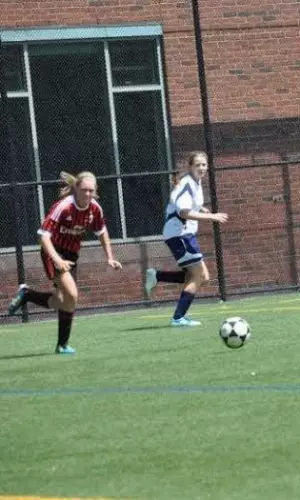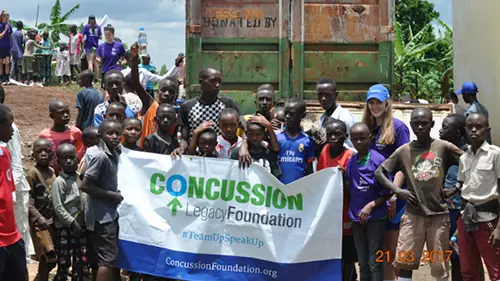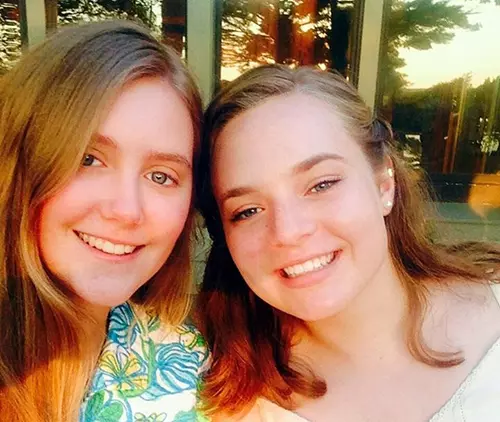Posted: April 25, 2016 | Written winter of 2015-16 during Esther’s medical leave
I suffered my first serious concussion in eighth grade. I struggled with Post-Concussion Syndrome (PCS) for about two and a half years and then suffered another serious concussion right before my junior year of high school.
Before my concussion in eighth grade, I played soccer, hockey, and tennis, I was a dedicated student, and life was good. I experienced the concussion during a soccer game, and did not know enough to take myself out of the game despite dizziness, nausea, blurry vision, and confusion. It took me a long time to realize that this was serious. I had no idea that this seemingly harmless hit would turn my life upside down.

Initially, all I wanted to do was play soccer. I wanted to get back to my team and continue playing, but this concussion was something that I could not hide. For the rest of eighth grade, a little over a month, I don’t think I was able to sit through a full class. I spent so much time in the nurse’s office drinking ginger ale and eating saltines.
It was bizarre to be sitting in math class and have all of the numbers on the board blur and get a headache so intense I had to leave class. Normally, I would have been a step ahead, solving homework problems during the lesson. Usually, I would have been excited that we were watching a documentary in history class, but now I would grimace, knowing that after watching the screen for only minutes, I would have to leave the room with a splitting headache and a wave of nausea. Even at the lunch table, because of background noise, I couldn’t focus on the person talking. Usually the one to be cracking jokes, it often took me minutes to get a joke or catch up with conversation.
I just never stopped having symptoms and have been struggling with Post-Concussion Syndrome (PCS) ever since.
Almost a year after this concussion, it fully hit me that I could not play contact sports anymore. I was crushed. Sports were a huge piece of who I was. I defined myself as an athlete. Sports were a shared interest I had with family and friends, and my club soccer team was so special to me. I lost a group of girls that I loved and a coach to whom I looked up and who had been a mentor to me for several years. I had spent probably twenty-five hours a week playing sports. I didn’t even know what to do with myself anymore.
I remember texting with my soccer coach, finally telling him that I definitely could never play again. He said “we all become fans at some point. You just became one a little earlier.” This was so comforting to me. He made it seem so normal and natural, like one door closes and another opens. This conversation gave me closure with soccer and the ability to move on and tackle new things.
‘I’m an athlete, and I can’t play contact sports, and I can’t run. What do I do?’ I remember thinking. My doctor suggested a low impact, non-contact sport; golf fit the bill. I had taken one golf lesson in my life (and I was terrible), but many people in my family were passionate golfers so I decided to try, banking on hereditary natural talent. I remember my first golf lesson. I barely made solid contact with the ball during that hour. Being a beginner at a sport was something I had not experienced since I was four. I was so frustrated. But, it was golf or the chess club so I started working hard. I went to the driving range after school, embarrassing myself in front of everyone, but I went. I took lessons even though it frustrated me that I wasn’t great after just a few lessons. I got better and my competitive spirit was back. Now, I’m not giving hard hits and sliding in mud on the soccer field, but rather hacking my way out of sandpits in polos at the golf course. I can hit a 230-yard drive, though. A change in sport, but once an athlete, always an athlete.
I started writing for my school newspaper, which I would never have had time to do had I been putting so much time into sports. I was appointed as an editor. I became a member of my school’s Disciplinary Committee, and I decided to row crew. I totally reinvented myself.
One of my doctors at Boston Children’s Hospital called me in April of tenth grade, asking me if I would do a live NESN interview with him about concussions and Children’s Brain Injury Center. I immediately said yes, not expecting it to manifest in anything. I quickly realized that I could help and that there are a lot of people out there silently soldiering on with PCS who go under the radar for medical care, with friends and family, and at school. I wanted to reach them because I guessed that they had all felt the same losses, disappointment, fear, and isolation that I had.
I had noticed a lack of education about concussions and PCS since eighth grade and decided that I needed to help change that. I did the interview as well as a few other events with Children’s and grew passionate.
Everything seemed to have fallen into place. I had developed new passions including concussion advocacy, I was still a strong student, and I was dealing with my symptoms. I felt like the ‘comeback kid’ and it felt amazing.
I was poised for a perfect junior year. I was taking two Honors and two AP classes, I was involved in extracurriculars I cared about, and I was feeling better than I had felt since eighth grade. Then, two weeks before school, I fell down a flight of stairs and suffered another bad concussion.
This was absolutely devastating. I tried to return to school and continue on with everything but this time I simply couldn’t.
I ended up having to take a medical leave from the school I had attended since age four. It seemed like yet again, my whole world had crumbled. I couldn’t participate in my school extracurriculars and my symptoms were worse than ever. The task of reinventing myself again seemed impossible.
But, I had my concussion advocacy, and that is what I have dedicated my year to, via an internship with the Concussion Legacy Foundation and continued work with Boston Children’s Hospital.

I want my legacy to be in educating the public – especially teenagers — about concussions and their long-term effects. Every person who plays sports deserves to know the risks—I certainly didn’t. I had no idea when signing up for middle school sports that I would be signing up for three years of headaches and symptoms. There is such a lack of education, even amongst athletes, and this needs to change. Concussion is a pervasive injury and can affect so many aspects of your life.
There are also rule changes that need to be made. Sports need to be safer. Do five year olds need to be tackling? Do six year olds need to be heading or checking into the boards?
I also just want to reach other people with PCS. It is hard to struggle through on your own, never having anyone who truly understands. Knowing that you aren’t alone and that your litany of misunderstood symptoms are a result of your injury is comforting.
I want to reach schools. Many schools do not understand PCS or know how to help students suffering with these symptoms. Many schools attribute PCS symptoms to other diagnosis, which severely disadvantages students with PCS.
I want to dispel this notion that concussion is solely a temporary and non-serious injury because it is simply not factual. True, most people recover in two to four weeks from a concussion, but multiple concussions take a toll. The reason that my eighth grade concussion was so bad was because I had probably suffered several minor concussions that I never took seriously and played through. This is so dangerous. There needs to be a cultural shift in order to change concussion reporting.
I get it, as an athlete you are supposed to be tough. You’re supposed to take hits and be fine. It’s different with head injuries. Playing with a sprain and potentially spraining again is nothing compared to potentially giving up your passions and totally changing your identity. It’s not worth it.
It takes a team to make a change like this. The coaches and players must all understand the severity of concussion and look out for each other. As a teammate, you have your quarterback’s back during the game, protecting him so he can make a play. You also have to have his back when he takes a hit and struggles to get up. Don’t put him back on his feet and give him a slap on the back. You have to say something and get him out of the game. That’s loyalty; putting him in imminent danger is not.
Though taking a medical leave was not ideal and this injury has totally changed my life and mostly not for the better, it’s made me stronger and I’ve realized that I have a cause that I care about more than anything else. I’m all in with concussions. I’ve found a passion and it might be a tad out of the ordinary. I’ve been through a lot and I don’t want other kids to go through what I’ve gone through. This is becoming an epidemic and we need to reverse the terrible effects.
At this point, as a teenager without medical credentials, I can’t cure concussions. So I’m going to do what I can do. I can share my story and my experiences.
I feel like I have an insight that only someone in the throes of PCS has and I want to use that. I want to be a cautionary tale of what happens when you don’t take minor hits seriously, but also as an inspiring story of getting back on your own two feet and getting back in the game even if it’s a new game. I hope that my story is one that other kids suffering with PCS can connect with, and I hope that I can reach schools and sports leagues. I’m all in.







